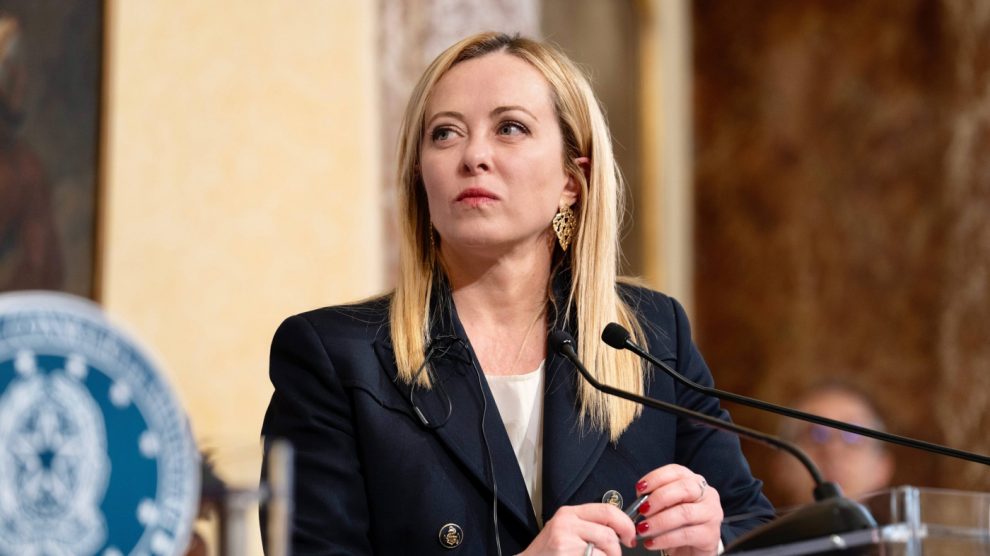Big Silk Road choice coming up. In 2019, Italy became the first and only G-7 country to join China’s Belt and Road Initiative – a globe-spanning investment platform and infrastructural project meant to project Beijing’s soft power internationally. The Memorandum of Understanding that underpins Rome’s adherence to it is set to self-renew in 2024, unless one of the parties decides otherwise.
- Over the past years, Italy has progressively distanced itself from China across sectors. This movement became undeniably clear under former Prime Minister Mario Draghi, and his successor, current PM Giorgia Meloni, has worked in continuity with this line.
- As a non-binding agreement that ultimately failed to spur deeper economic integration, the BRI MoU is more symbolic than substance. However, the upcoming choice does carry a lot of political weight.
There’s growing attention on the matter, both in the country and abroad. Recently, the issue has surfaced in a number of international news outlets – including Bloomberg, Politico (in the China Watcher newsletter), CNBC and SCMP –, reflecting Washington’s hope that Rome might ditch the BRI. Meanwhile, back in Italy, national newspapers have been widely covering the issue.
- Italy’s allies, most notably the United States, had voiced their doubts back in 2019. Today, they’re increasingly interested in what the Italian government, led by Giorgia Meloni, will do…
- … because, as the increasingly assertive China and the US, along with other Western countries, drift further apart, both outcomes of Rome’s upcoming choice entail a geopolitical field choice.
Where does Meloni stand? The PM has not yet taken a definitive position and prefers not to speak publicly about the matter at this stage. Nevertheless, the PM expressed closeness to Taiwan and called the MoU “a big mistake” on the 2022 elections’ campaign trail.
- More recently, Foreign Minister Antonio Tajani stressed that Rome is aligned with the EU and NATO vis a vis Taiwan. Agriculture Minister Francesco Lollobrigida, a close ally of the PM, assured that Italy would coordinate with both Western institutions on the MoU’s renewal. And Defence Minister Guido Crosetto noted it’s “unlikely” she will renew it.
- Also, Giangiacomo Calovini – an MP in PM Meloni’s party and member of the Lower House Foreign Affairs Commission – just told our sister website that “it is not necessary to renew this memorandum in order to work with Beijing.”
- And finally, Andrea Crippa – deputy head of Matteo Salvini’s League, which is in government – told us that he would “hardly support a position that would […] deliver us into the hands of the Chinese, allowing them, among other things, to build strategic infrastructure.”
Time to choose. As former Italian permanent representative at NATO, Ambassador Stefano Stefanini, wrote on La Stampa, the Meloni government has been sailing smoothly on the Atlantic side of things thanks to the “lighthouse” that is supporting Ukraine. Now, however, “the time of the international balancing act is over. And there are no safety nets. In this case, whoever falls will hurt themselves either on the Atlantic side, or in the Chinese belly.”
- The right choice is evident, he argues: unless Rome wants to collide with Washington and isolate itself internationally, it ought to drop the BRI (which, again, did not translate into additional economic advantages for Italy when compared to other EU countries).
- That must be done with the right timing and manner, adds Ambassador Stefanini, so as to soften China’s inevitable reaction. The G-7 summit in Hiroshima, scheduled for May 19-21, will produce China-heavy communiqué – and that could be the chance for allies to provide some political cover.
The power of choices. Still, there’s a political dividend waiting for PM Meloni if she goes through with this line of action. That is, wiping Italy’s perceived unreliability from its reputation and burnishing its credentials as a firmly Atlanticist country, as it has been for the past years. Such a line would also allow Italy to stand out in the EU, where the two other biggest economies – namely France and Germany – often fall back on geopolitical ambiguity to curry favour with Beijing and push their economic interest, shrouding it all in a Europeanist narrative.





